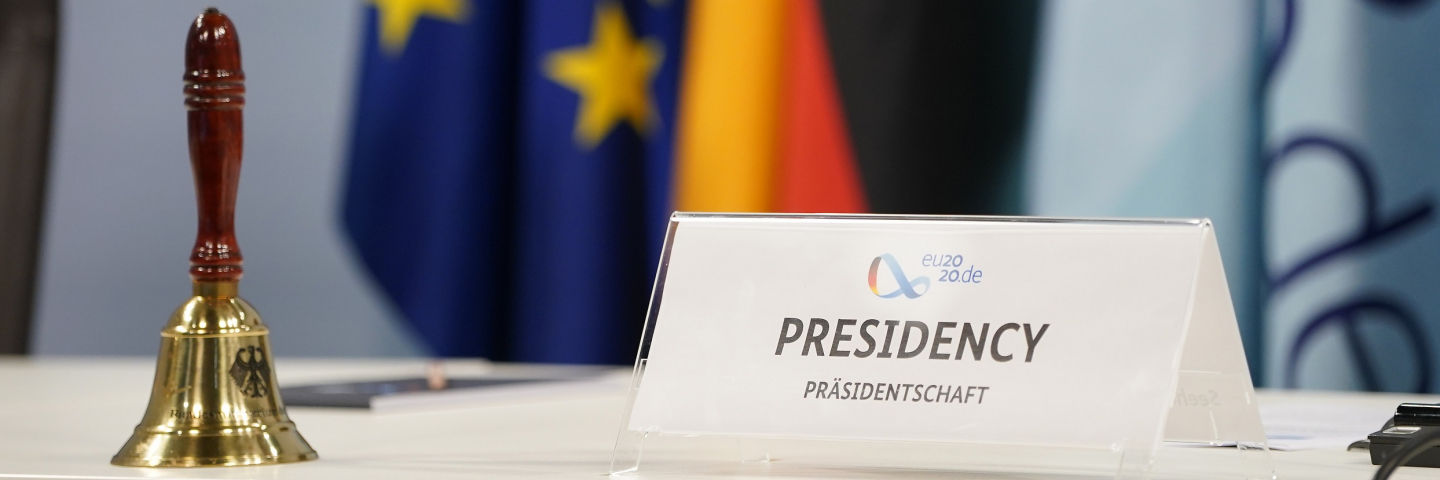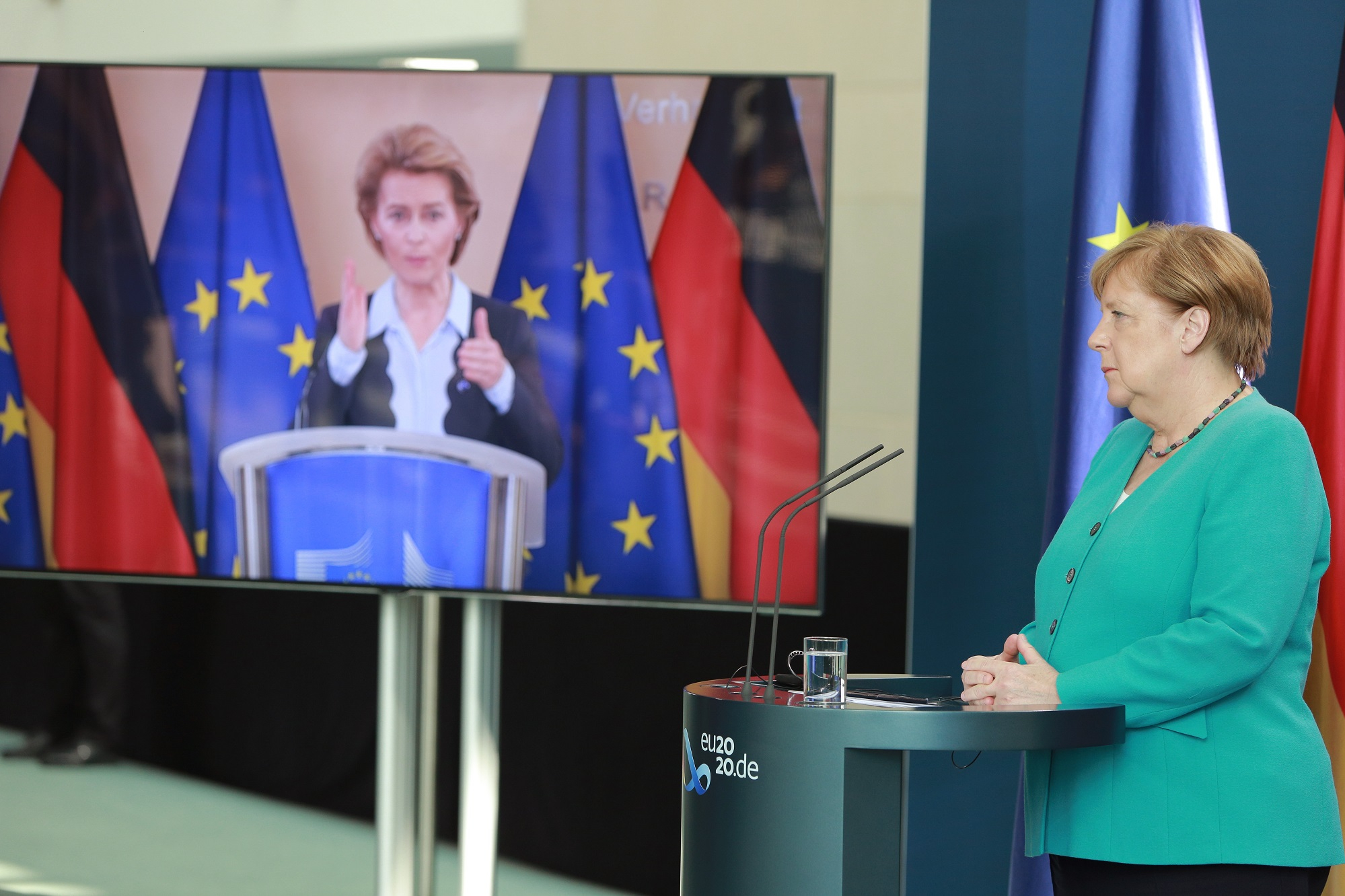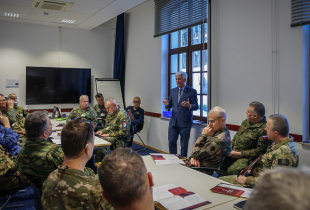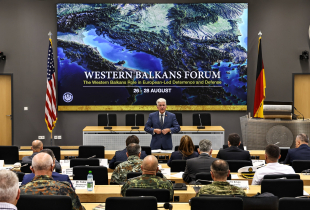
“Germany’s EU Presidency 2020: The Security Dimension and EU-NATO Cooperation”
On July 1, 2020, Germany assumed the Presidency of the Council of the European Union for the second half of 2020. How Germany manages the EU Council presidency will be of utmost importance for the future of the European Union as well as for the transatlantic relationship. The German EU presidency faces two major challenges: first, containing the coronavirus crisis and working towards a European economic recovery and second, initiating a lasting dynamic towards European solidarity, and autonomy. How are the two challenges intertwined with security questions? Germany intends to promote closer EU-NATO security cooperation. The coronavirus pandemic has tested this envisaged cooperation, but also offered new opportunities. Hence, what is the pandemic’s impact on Germany’s ambitions for EU-NATO cooperation?
On July 2, 2020, the Marshall Center brought together a group of experts and alumni from Belgium, Croatia, Germany, Hungary, Lithuania, Poland, Portugal, Romania, Slovakia, and the United States in a virtual workshop designed to share their expectations for Germany’s EU presidency as well as generate ideas about how to lay the groundwork for strengthening Euro-Atlantic security and EU-NATO cooperation going forward. The following takeaways are informed by the discussion.
1. Don’t Overhype: Limitations for Germany’s EU Presidency
Germany’s EU presidency program, which was presented on July 1, 2020, lays out four priorities:
1. Overcoming the consequences of the corona virus pandemic and the economic recovery;
2. Finishing the negotiations for the Multiannual Financial Framework 2021-2027;
3. Successfully negotiating the future relationship with the United Kingdom;
4. Making progress on further topics, including climate protection, digitalization, and Europe’s role in the world.
The entire program of activities is called “Together for Europe’s Recovery.”1 The agenda already seems to be overburdened by the current corona crisis, pressing dossiers like the Multiannual Financial Framework,2 and the post-Brexit negotiations. The preoccupation with the internal recovery will limit the room for maneuver in the security dimension of the EU presidency.
The influence of the presidency of the Council of the European Union has diminished since the Lisbon Treaty. Germany has to coordinate its presidency in the context of the so-called Trio presidency. This means that the Federal Republic has to synchronize its intentions with Portugal and Slovenia, the two member states that follow Germany in the next eighteen months as EU Council chairs. Hence, diplomats from Berlin, Lisbon, and Ljubljana drafted the Programme of the Trio Presidency.3 Germany must also coordinate with the permanent President of the EU Council, Charles Michel, and the Foreign and Security Affairs Council permanently chaired by the High Representative of the Union for Foreign Affairs and Security Policy, Josep Borrell, as well as with Paschal Donohoe, President of the Eurogroup. Therefore, the presidency of the Council of the European Union is a prominent, but certainly not dominant actor, in the current EU structure. Even an influential EU member state like Germany can only act as an honest broker between member states, the EU commission, the European Parliament, and the several permanent council presidencies. The success of Germany’s EU presidency thus will depend on the ability to forge compromises, provide incentives, and orient itself towards the model of a solidarity-based and autonomous Europe.4 A “European Germany” and smart diplomacy are required to avoid any impression that Germany is pushing its own narrow interests. Leadership means moderation!
2. Expectations from Partners
The manifold limitations of Germany’s EU presidency contrast with the high expectations in the public debate. Realistic expectation management needs to be part of any strategic communication throughout the next six months. The German government should seize the opportunity to listen carefully to the expectations of friends, allies, and partners and use the power of persuasion to build solidarity among member states and thus create the foundation for a further path to recovery. This will be of utmost importance for economic recovery, with the EU Commission’s proposal of a €750 billion economic stimulus plan on the table. Together with the negotiations on the Multiannual Financial Framework 2021-2027, Germany has to mediate between the diverging demands for solidarity vis-á-vis the countries hardest hit by COVID-19 like Italy and Spain and countries insisting on a European austerity policy like the Netherlands, Austria, Denmark, and Sweden, the so-called “frugal four.” The German-French proposal has opened a way towards compromise, but whether it materializes depends heavily on the success of Germany’s diplomacy.
Despite preoccupation with these issues, partners still expect Germany to keep the security dimension high on the EU agenda and not to let it become another victim of the COVID-19 pandemic. This will certainly require finding a balance between economic recovery and proper funding for security in the EU budget. The reason for maintaining sound security funding derives from the perception of the deteriorating global security environment. The key element is the rising tension in the Sino-American relations; the lack of global leadership by the Great Powers in the international crisis management of COVID-19 and the U.S. presidential elections on the horizon also matter. Taking all this into account, the EU needs to strengthen its global role and its strategic autonomy by pushing forward the efforts for a true European Defense Union that is strategically complementary with NATO.
3. Transatlantic Strains
Given current transatlantic tensions, transatlantic rapprochement in the shape of EU-NATO cooperation seems to be unrealistic. The German-U.S. relationship is very much under strain, in particular over the conflict on NATO’s 2% goal and the announcement of withdrawing 9,500 U.S. forces from Germany and moving some of them to Poland based on a bilateral security arrangement between Washington and Warsaw. This will not only undermine NATO’s solidarity but will also stress the concept of NATO’s collective defense approach.
Germany thus needs to be careful with proposals on the EU Defense Union, as this might result in further heating up the transatlantic debate on strategic autonomy of the EU versus strategic complementarity with NATO. Germany has proposed a “strategic compass” for the EU, which should help identify common threats and establish a European strategic culture to enable the EU and its member states to identify security priorities and build capabilities accordingly with PESCO, CARD, and EDF. Some allies are cautious regarding this strategic compass. They see a diverging process between the EU and NATO. They plead for keeping NATO’s 2030 process as close as possible to the EU’s strategic compass initiative. In lieu of the growing U.S.-EU tensions, an EU-U.S. strategic dialogue has been proposed on several recent occasions. Such a dialogue could nicely fit with the above-mentioned EU and NATO initiatives within a “bouquet of strategic dialogues.” Berlin might be well advised to wisely embed such a dialogue into its EU Council presidency and beyond.

BERLIN, GERMANY - JULY 02: German Chancellor Angela Merkel and European Commission President Ursula von der Leyen (via live video transmission) speak to the media following talks at the Chancellery on July 2, 2020 in Berlin, Germany. Germany yesterday assumed the six-month, rotating presidency of the European Council.
4. Resilience Building
COVID-19 has shown that the societal, economic, and health sector resilience of EU members, neighbors, friends and partners has been dramatically stressed. Adversaries exploited vulnerabilities and launched malicious disinformation campaigns. Russia and China seized the COVID-19 pandemic and opened their hybrid threat tool box to undermine European citizen’s trust in functioning state institutions. In consequence, resilience-building must be a key effort for the EU’s neighborhood policy in the near future. Complementarily, this requires as well an even more strongly coordinated EU-NATO effort. Means must be made available to build resilience of partners recovering from COVID-19 and to protect them from further hybrid threats originating from Moscow or Beijing.5
5. EU-NATO Cooperation: Elements of a COVID-19 Agenda
As a matter of fact, EU and NATO have been working very well together during COVID-19 countering hybrid threats.6 Strategic communication in particular and countering hybrid threats have been identified as areas of EU-NATO cooperation that are crucial for the security of member states and partners.7 Military mobility and capabilities development are also still important elements for EU-NATO cooperation. The COVID-19 agenda for EU-NATO cooperation comprises civil-military cooperation. In particular, the questions of military support services for civilian structures, military contributions to resilience building, and improving civil and disaster protection are on the EU-NATO agenda. This can open a new chapter for deeper EU-NATO cooperation.
Conclusion
Even if Germany’s EU Presidency seems to be overburdened with managing the COVID-19 pandemic in terms of economic and political recovery, a huge security dimension remains. Countering hybrid threats, building resilience, and strengthening civil-military cooperation in civil and disaster protection are areas for even more and closer EU-NATO cooperation. COVID-19 has made EU-NATO cooperation not obsolete but rather even more important. The security dimension of Germany’s EU Presidency is relevant for the overall recovery from COVID-19 and its side effects. Partners cannot expect that Berlin’s EU Council presidency will heal all coronavirus-related economic and societal wounds. Partners can also not expect that the Union turns immediately into an autonomous security actor seeking its role in Great Power competition. But partners and friends are expecting Germany not only to serve as an honest broker in its EU presidency, but also to provide effective initiative and leadership.
The author thanks Matthew Rhodes and Sebastian von Münchow for their collaboration in development of the workshop and for comments on previous drafts of this paper.
For Academic Citation
Ralf Roloff, “Germany’s EU Presidency 2020: The Security Dimension and EU-NATO Cooperation” Marshall Center Perspectives, no. 15, July 2020, https://www.marshallcenter.org/en/publications/perspectives/germanys-eu-presidency-2020-security-dimension-and-eu-nato-cooperation-0.
Notes
1 German Federal Government, “Together for Europe’s Recovery,” Programme for Germany’s Presidency of the Council of the European Union, https://www.eu2020.de/eu2020-en.
2 For more information, see https://ec.europa.eu/info/strategy/eu-budget/documents/multiannual-financial-framework_en.
3 German Federal Government, “Trio Programme of Council of the European Union” (1 July 2020 – 31 December 2021), Germany, Portugal, Slovenia.
4 Eckehard Luebkemeier and Nicolai von Ondarza,“A Corona Presidency in the Coronavirus Crisis?” Stiftung Wissenschaft und Politik [German Institute for International and Security Affairs], SWP Comment No. 33, June 2020, https://www.swp-berlin.org/10.18449/2020C33/.
5 See “Disinfo Review” at https://euvsdisinfo.eu/disinfo-review/, which is EUvsDisinfo’s weekly newsletter. Issued every Thursday, it summarizes the main pro-Kremlin disinformation trends observed during the previous week.
6 EU / NATO, “Fifth progress report on the implementation of the common set of proposals endorsed by EU and NATO Councils on 6 December 2016 and 5 December 2017,” Brussels, 16 June 2020, https://www.nato.int/nato_static_fl2014/assets/pdf/2020/6/pdf/200615-progress-report-nr5-EU-NATO-eng.pdf.
7 Ralf Roloff and Pal Dunay, “The Age of Post-Truth. Communications Challenges on Europe’s Eastern Flank,” Per Concordiam, Vol.10, issue 2, 2020 pp. 11-19, http://connections-qj.org/article/age-post-truth-state-influence-and-strategic-communication-contemporary-security-challenges.
About the Author
Prof. Dr. Ralf Roloff has been the Deputy Dean for Resident Programs at the George C. Marshall Center´s College of International and Security Studies (CISS) in Garmisch-Partenkirchen, Germany, since 2018 and Associate Professor at the Bundeswehr University Munich since 2015. He has also been the Director of the Master in International Security Studies Program (MISS) since 2010. From 2003 to 2018 he was Senior German Professor at the CISS, and from 2015 to 2018 he served as Course Director of the European Security Seminar.
The George C. Marshall European Center for Security Studies
The George C. Marshall European Center for Security Studies in Garmisch-Partenkirchen, Germany, a German-American partnership, is committed to creating and enhancing worldwide networks to address global and regional security challenges. The Marshall Center offers fifteen resident programs designed to promote peaceful, whole of government approaches to address today’s most pressing security challenges. Since its creation in 1992, the Marshall Center’s alumni network has grown to include over 14,000 professionals from 157 countries. More information on the Marshall Center can be found online at www.marshallcenter.org.
The articles in the Perspectives series reflect the views of the authors and are not necessarily the official policy of the United States, Germany, or any other governments.

